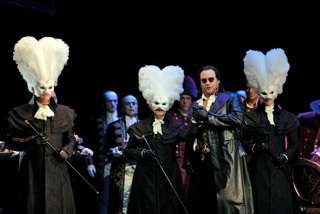|
Back
A Rogue's Last Rendez-Vous San Francisco
War Memorial Opera House
10/15/2011 - & October 18, 21, 23, 26, 29, November 2, 5, 10, 2011
Wolfgang Amadeus Mozart: Don Giovanni K. 527
Lucas Meachem (Don Giovanni), Ellie Dehn (Donna Anna), Serena Farnocchia (Donna Elvira), Marco Vinco (Leporello), Shawn Mathey (Don Ottavio), Kate Lindsey (Zerlina), Ryan Kuster (Masetto), Morris Robinson (Il Commendatore)
San Francisco Opera Chorus, Ian Robertson (chorus master), San Francisco Opera Orchestra, Nicola Luisotti (conductor)
Gabriele Lavia (director), Allessandro Camera (set director), Andrea Viotti (costume designer), Christopher Maravich (lighting designer), Paul Szczesiul (production super captain), Gerd Mairandres (wig and makeup designer), Lawrence Pech (choreographer), Jonathan Rider (fight director)

(© Cory Weaver/Courtesy of SFO)
Gabriele Lavia's Don Giovanni is clearly a 21st century production. The curious staging – a hall of mirrors – which intermittently rearranged themselves according to scene, but with perplexing relevance to the revised placement – was a feat of stage engineering, involving the Company's new motorized rigging system and a complicated software algorithm. The contemporary but not quite avant-garde reflecting set felt suspiciously, as though draconian budget cuts were constricting artistic freedom. The Company's lighting wizard, Christopher Maravich, had the thankless task of preventing distracting reflections from those mirrors on stage, yet his success proved once again his technical genius.
Contrast the behavior of a libertine with the surging tide of political liberty at the time the opera was written. Personal liberties were expanded under the umbrella of political freedom, and pathological interpretations of that liberty resulted in personal antics which could cause great mischief. Of course, the struggle between the evil of one individual against the good of an emancipated state is one of the reasons why Don Giovanni has universal appeal. This narcissistic sociopath is empowered to indulge his vices with often-disastrous consequences for his victims. It is society's good fortune that the rate of such personality-disordered individuals is quite low (approximately one out of twenty-five persons). The crime rate may be lower within a state ruled by a despot, but what a steep price to pay for government-mandated “safety.”
Despite the production as a whole being quite exemplary, the opening scene was perplexing. According to the libretto, Anna is in hot pursuit of Giovanni, who has just attempted to rape her. Yet her behavior is ambiguous: Is Anna angry or disappointed at the interrupted assault? Who chases down one's attacker? Anna's father, The Commendatore, seeks to defend his daughter's honor only to unsuccessfully challenge Giovanni to a duel. Within the first five minutes of staging, Giovanni has incurred two enemies and, with one cut of his sword, impaled his own fate.
Both theatrics and music were on par with the high standards of this second-largest American opera company. Baritone Lucas Meachem as the villain du jour bestowed a lush velvet tone which his diffidently loyal servant, Leporello, played by Marco Vinco, was able to match with faultless diction and gorgeous resonance. As is often the case, Leporello as Giovanni's manservant was the audience favorite, as servant pitilessly but humorously mocked master's egocentric behavior. The grand seducer strutted like a peacock, draped in leather and sporting shades, with the occasional flutter of a white handkerchief. The counterpoint between characters is a hint at the complexity beneath the ostensible superficiality of Lorenzo da Ponte's libretto, demonstrating his established relationship with Mozart and his obvious comprehension of the composer's operatic vision. Leporello enjoys many deliciously comic vignettes thanks to Mozart's adroitness at juxtaposing buffoonery with evil. Don Ottavio, yet another victim of Giovanni's exploits, is theatrically portrayed by tenor Shawn Methey. The Commendatore's utter immobility during the graveyard scene was the epitome of controlled endeavor.
Don Giovanni offers multiple opportunities for ambitious female soloists, and the ladies' singing was glorious. Soprano Ellie Dehn, returning from last year's appearance as Countess Almaviva in Le nozze di Figaro, is a treasure. Her portrayal of Donna Anna, who suffers the greatest tragedy at Don Giovanni's behest, steered clear of overacting but engaged a robust yet expressively nuanced response to the unforgivable actions of a self-involved, hedonistic villain. Donna Elvira was nicely played by Serena Farnocchia's honeyed soprano delivering a lovely “Mi tradi.” Mezzo-soprano Kate Lindsey as Zerlina added to the overall coalescence of the cast, bringing vibrancy to the role which is unusual and delightful.
The mammoth-sized wigs of Anna, Elvira and Ottavio, as party-goers whose revenge against the anti-hero is near fruition, comprised the highlight of this production's fashion statement.
Maestro Nicola Luisotti and the San Francisco Opera Orchestra produced a luscious accompaniment to the efforts of the actors. A sensitive conductor alert to singers' phrasing and volume, his orchestral support is a discreet blend of deference to those onstage while brooking no compromise to his own lofty standards.
Claudia K. Nichols
|